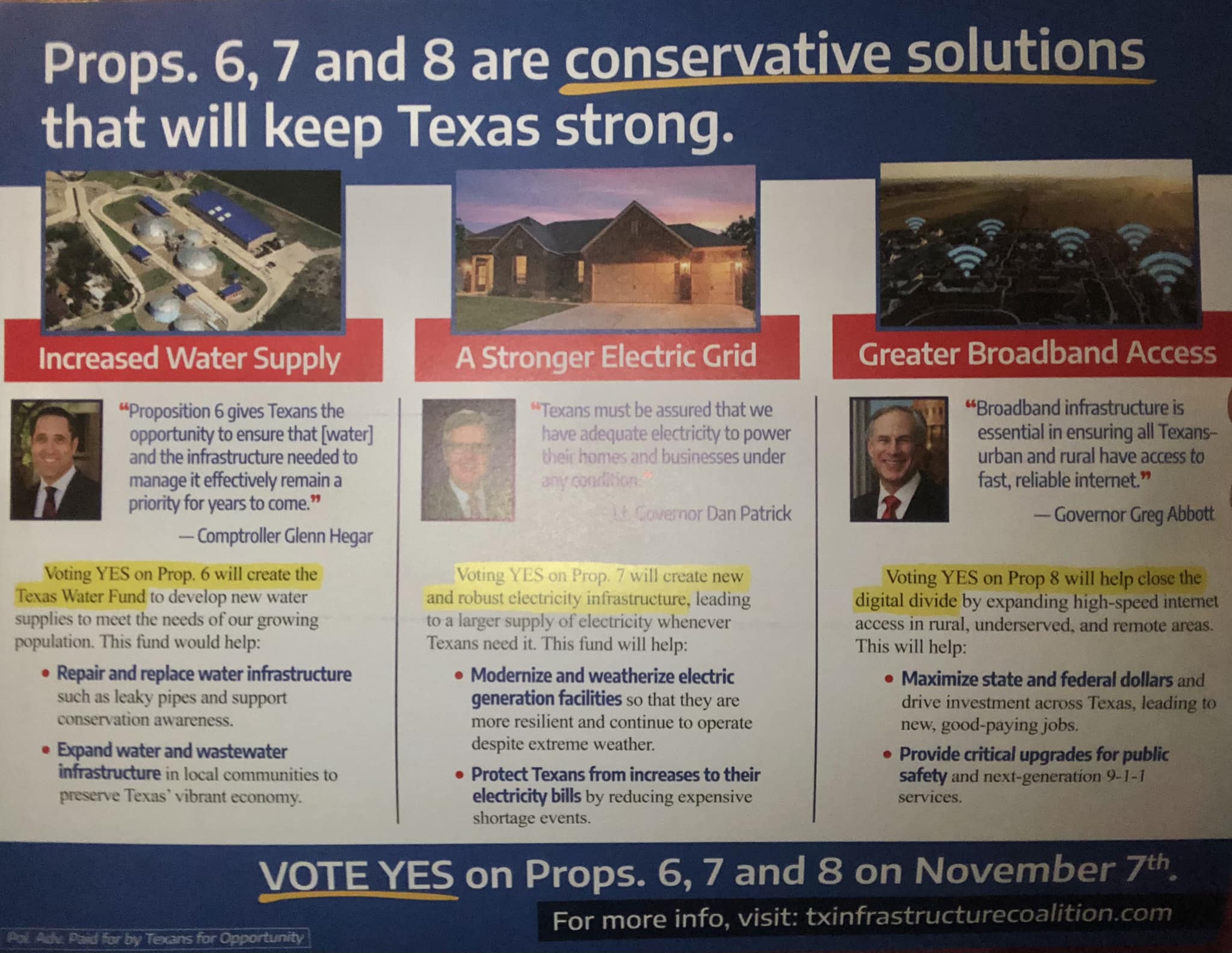The creation of several potential slush funds are on the ballot in Texas this Tuesday, as voters are expected to trickle to the polls to decide on 14 proposed constitutional amedments.
Five of those propositions would create “off-budget” funding for a variety of causes, inlcuding rural broadband, preparing for future water requirements, more funding for system universities, strengthening Texas’s virtually standalone electric grid, and expanding/improving state parks. It all sounds great, on the surface.
In Texas, all funding is by default overseen by the Texas Legislature, which meets every other year. To establish a special fund to be overseen by a state agency or other entity, the Texas constitution must be amended, which requires a statewide vote for ratification. Texas voters (the ones who turn out, anyway — an estimated 10% will even bother) will determine whether or not these proposals are efficient ways to spend money without the hassle and risk of going through the Legislature or if they are slush funds. According to Investopedia, a slush fund is “a sum of money set aside as a reserve, functioning either as an innocent rainy-day fund or a platform to finance illicit activities” (time will tell whether any of these are “illicit,” and assuming these all will pass by large margins).
Despite the high odds that each proposition will pass, interest groups and those with dogs in the hunt are not taking any chances. Primary voters have been inundated with mailers for many of these propositions, which so far have drawn just over 7% of eligible voters to the polls in early voting. Let’s take a look where the money is coming from.
A PAC supported by Texas Realtors titled Texans for Opportunity is pushing Propositions 6, 7, and 8 (water, grid, and broadband, respectively). A large-size postcard from the PAC containes quotes from three statewide officials — Comptroller Glenn Hegar, Lt. Gov. Dan Patrick, and Gov. Greg Abbott. But only one is actually in reference to a proposition (Hegar, water, Prop. 6). The quotes from Patrick and Abbott are non-endorsement comments in favor of improving electric delivery and broadband availability. Mighty sneaky.
Another mailer, paid for by Texans for More Top Ranked Texas Universities, is supporting Prop. 5, and represents a wider coalition. Energy giants Exxon Mobil, Oxy, and Valero, Southwest Airlines, and the University of North Texas Foundation (the largest donor at $80,000) all chipped in, plus a foundation supporting Texas Tech (in-kind legal services) and beer distributor CEO John Nau III ($25,000) with the largest of the personal donations. UNT and Texas Tech have each strongly benefitted from the existing National Research Universities fund, which the proposition hopes to convert into a permanent fund to keep this new source of revenue (from state rainy day fund interest) going.
Proposition 14, for expansion and improvement of state parks, is also supported by a wider net, Texas Coalition for State Parks PAC, with top donors including land developer and homebuilder Rod Sanders of Plano ($50,000), energy exploration company Apache Corporation ($15,000), and, perhaps not too surprisingly, Washington-based sporting gear retailer REI ($10,000).
A PAC supportive of Proposition 8’s billion-dollar broadband expansion (see below — no exaggeration on the amount!), Texas Broadband Now, has not reported at the time of writing.
Election Day in the Lone Star State is Tuesday, Nov. 7, from 7 a.m. to 7 p.m.
Advertisement
See below for our previous analysis on each of the “off-budget” propositions.
Proposition 5 — Rename State University Research Fund and Establish Ongoing Revenue Source Amendment (HJR 3). This would 1) rename Texas’ National Research University Fund as the Texas University Fund, and 2) assure that institutions in four university systems — Texas Tech University, the University of Houston, the University of North Texas, and Texas State University systems — would qualify for around $200 million for 2024-25, paid for by interest from the Rainy Day Fund. (Texas A&M and University of Texas already benefit from what’s known as the Permanent University Fund, or the PUF, financed by profits from the General Land Office — more on that below.) The original purpose of the fund was to help certain universities achieve National Research University status. Mission accomplished there, and Texas is better off for it. We assume that by continuing this source of funding that certain universities would not have to raise tuition and fees even higher than they have already been raised over the past decade-and-a-half. In theory, anyway. But in reality, this will not happen (as proven by tuition deregulation and an associated sharp rise in tuition and fees). The Legislature as our elected representatives (keep in mind that university Regents are not elected, but appointed and confirmed by the state Senate) must retain control of the purse strings wherever it can — letting the research fund ride off into the sunset might be a good first step toward that goal. Those in favor of this proposal have pointed out that UT and A&M get preferential treatment when it comes to special funding, so why not give the aforementioned other systems a fund, too? But what about system-independent state universities such as Texas Woman’s University and Texas Southern University? If the goal is to treat public universities more equitably, why not work to increase the portfolio of the PUF and fund non-Aggie and Longhorn institutions with it, rather than approve yet another special fund not accountable to the voters? Too many questions raised with not enough answers for us to support it.
Proposition 6 — Creation of the Water Fund (SJR 75). The Texas Water Development Board (TWDB) would oversee this new fund to make strategic investments designed to better manage water supply issues. There are growing number of straws in our aquifers due to the industrial and residential needs of our booming population. We’re going to need some better strategy on how to build reservoirs and other resources for our growing cities in a way that won’t infringe on the rights of smaller and rural communities and water districts. Fully $1 billion would be coming out of general revenue for this, but the amendment requires that at least 25% of it would go toward new water sources, e.g. lakes. However, the Legislature should retain control of this process as the TWDB board is not elected. This process should remain part of the state budget process to avoid local governments and property owners getting stepped on.
Proposition 7 — Creation of State Energy Fund Amendment (SJR 93). Enter: the Texas Energy Fund, which would finance the construction, maintenance and operation of electric generation facilities keep the grid stable. The Public Utility Commission would oversee this fund, but it’s not an elected board. The PUC is appointed by the governor, therefore it’s a step away from public accountability, and is primarily why we suggest voting against Prop. 7. Regardless of whether this passes or fails, we have four new threats to deal with: 1) wanton ideologues such as Congressman Greg Casar who want to connect our grid to the rest of the nation, 2) a pervasive kowtowing to “green guilt,” which subjects our grid to unstable sources as a major part of our electric output, 3) the increasingly real possibility of terrorist and foreign attacks on our infrastructure, and 4) a sharp increase in consumption as more Texans prematurely (thanks to federal intervention) opt for electric vehicles. The growing incompetence of our federal government is only accelerating these risk factors. Responsiveness is needed here, but better planning and budgeting is the answer.
Proposition 8 — Creation of Broadband Infrastructure Fund Amendment (HJR 125). This would allow the Comptroller’s office to oversee a fund to expand broadband Internet in Texas. The Comptroller is elected and accountable to the public, therefore a special fund would not necessarily be out of the question. But we say let the market handle this! This proposition does not do much to manage the quality of the infrastructure to be built — are we talking high-capacity fiber lines or wireless? And if wireless, won’t open-market services such as Starlink solve much of the dilemma in short time? Here’s where voting for it becomes tempting: the federal government via the BEAD program offers to match state funds on a 4:1 basis. That’s money Texas would be turning down by voting against. But consider that Texas has already allocated $600 million to broadband, which means we could have a new bureaucracy with a vague mission and billions of dollars — all at the disposal of the Comptroller and any federal strings attached. Alternative: next session, provide temporary tax breaks and other incentives for ISPs to expand high-speed service in the hinterlands.
Proposition 14 — Creation of the Centennial Parks Conservation Fund Amendment (SJR 74) Creation of the Texas Centennial Parks Conservation Fund. Centennial refers to 100 years of the Texas parks department. Maintaining a parks system is a proper function of government, even if not an essential one. The Texas Parks and Wildlife Department would be in charge of this new purse, dedicated solely to facilities improvement and land acquisition, to funded by an initial $1 billion in general revenue and private sector donations. TPWD generally does a world-class job on its facilities, so it would not be the end of the world should this pass. But the TPWD board is not elected by the public, and is therefore a step away from direct voter accountability.
Advertisement
Advertisement


